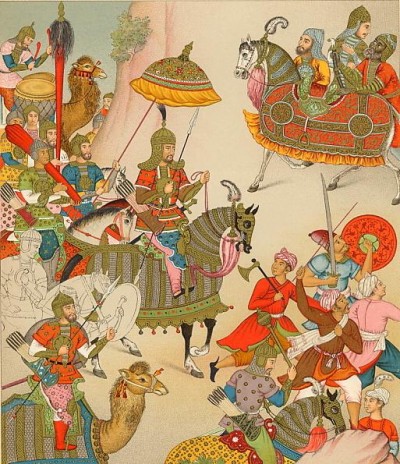First Battle of Panipat War
First Panipat war:
The Panipat war had a lot of Importance in Indian history, causing the establishment of the Mughal Empire by Babur in India. Such a critical war happened on 21 April 1526 between the Afghan invader Mughal Emperor Babur’s forces and the Delhi Sultan Ibrahim Lodi. Babur introduced cannons in the war and gained victory over Ibrahim Lodi. This was one of the earliest battles involving Gun power firearms. The two armies fought with each other at a place called Panipat. So the war was named the Panipat war.
In Afghanistan, the political changes affect Babur’s search for establishing his power in India. Then he sought help from the Persian nobles and invaded Delhi under the rule of Ibrahim Lodi. The political differences among the local Indian kings made it easy for Babur to succeed in the First Panipat war. He came to India with an army of only 12000 soldiers and utilized the local leaders and success to establish the Mughal Empire in India. Some historical views add that, with the support of local leaders and tribes, Babur’s army reached 30,000 soldiers.
Babur’s Success in First Panipat War
Babur came up with a plan that Ibrahim successfully negated. In the last stage of the march, Babur ordered his men to gather many carts. They collected seven hundred coaches lashed together using ropes to connect the coaches. Enough space left between each pair of coaches to place five or six mantels, and Babur’s matchlock men were posted behind the mantels. Several gaps were left on the line, separated by an arrow’s flight, each wide enough to let 100-200 horsemen use them. The town of Panipat and the other flank by a barrier of brush and ditches protected one side of Babur’s line. He split his army into the usual left, right, centre and vanguard. He planned to wait for Ibrahim to attack the fortified line and then have the flanking parties attack the enemy army’s rear.

Impact of the First Panipat War
The biggest problem Babur faced was getting Ibrahim to attack. Every day Babur’s men rode out towards the enemy camp, firing arrows into their massed ranks, attempting to provoke the enemies too far in the lure but not succeeding. Eventually, Babur launched a night attack on Ibrahim’s camp, hoping this would cause a battle. A force of 4,000-5,000 men was selected to make this attack, but the night march went severely wrong and alerted Ibrahim Lodi’s army. Finally, one morning on 21 April, Ibrahim left his camp and moved to attack Babur’s lines.
Also Read: The Great Kalinga War
Babur’s plan worked perfectly. His flanking parties attacked the rear of Ibrahim’s force, and the left and right wings shot its sides. Ibrahim could not force his way through the barriers in Babur’s centre, and his army became increasingly compressed. His left and right wings were soon unable to either attack or retreat, leaving only his centre active. Mainly the archers played a crucial role in fighting with the large Ibrahim Lodi army. Two small cannons supported Babur’s army.
Establishing the Mughal Empire in India
During the First Panipat war, Ibrahim lost his hope of victory; the fierce attack of the archeries of the Babur army and the force of the Cannons caused the Ibrahim army fear. They dispersed from the battlefield to save lives. This made Ibrahim very stressed, became a wicked heart and killed himself. However, his body didn’t discover until later in the afternoon. Babur dispatched a force towards Agra to try and catch the fleeing Sultan before sending Humayun with a more significant point to occupy the city and seize Ibrahim’s treasury. The Mughal soldiers had killed around 15-16,000 of the enemy army, although the inhabitants of Agra estimated the losses at 40-50,000. Many of the survivors were captured, cruelly treated and slaughtered. Three days after the battle, Babur entered Delhi, where he found Ibrahim’s mother, family and a number of his prisoners, treating both groups well.
The First Panipat War established Babur as a significant power, causing the Mughal Dynasty in Hindustan. At first, he had only authority over Punjab, Agra, and Delhi. In the later years, he succeeded in expanding the Mughal Empire by conquering the neighbouring regions. This First Panipat War made the Mughals establish a strong empire that ruled the entire Hindustan for 300 years.